Key takeaways:
- Fine dining creates unforgettable experiences through exquisite flavors, elegant presentation, and exceptional service that connects diners to the culture of the food.
- Vegan cuisine reimagines traditional dishes with creativity, promoting sustainability and respect for natural ingredients while demonstrating that plant-based meals can be satisfying and flavorful.
- Moroccan culinary traditions emphasize the importance of spices, communal dining, and meticulous cooking techniques, making food a celebration of culture and togetherness.
- Adapting Moroccan recipes to vegan versions showcases how traditional flavors can be preserved while creating innovative plant-based dishes that evoke shared memories and connections.
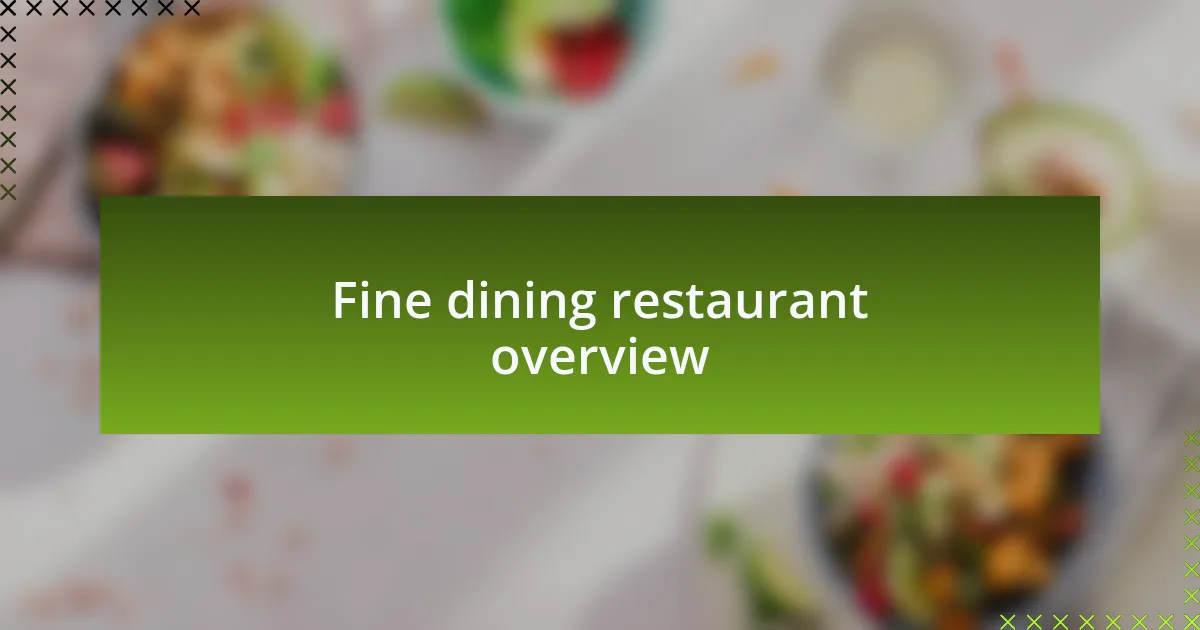
Fine dining restaurant overview
Fine dining restaurants often create an unforgettable experience, blending exquisite flavors with an elegant atmosphere. I still remember walking into a beautifully decorated establishment, the soft lighting setting a serene ambiance. Have you ever felt your excitement peak as the aroma of delicate spices wafted through the air?
The meticulous attention to detail in fine dining is truly remarkable. I’ve watched chefs artfully plate each dish, transforming food into a visual masterpiece. Isn’t it fascinating how the presentation can elevate our anticipation and enjoyment of a meal?
Moreover, the service in fine dining is typically exceptional, often making you feel more than just a guest. I recall an experience where the waiter shared stories about each dish, connecting me to the culture and ingredients in a heartfelt way. Isn’t it incredible how such personal touches can make a night out feel truly special?
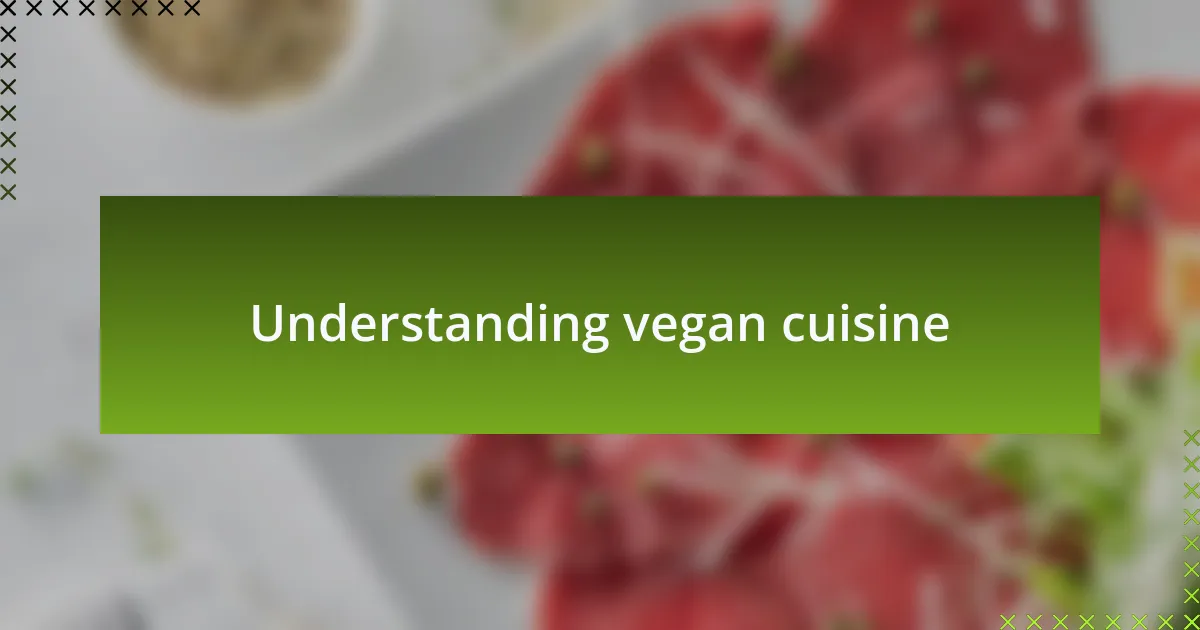
Understanding vegan cuisine
Understanding vegan cuisine delves into a world of creativity and flavor, where traditional dishes are reimagined without animal products. I remember the first time I tried a vegan tagine; the rich aromas of saffron and cumin drew me in, and I was pleasantly surprised by how hearty and satisfying it felt. Have you ever discovered a dish that completely changed your perception of what vegan food could be?
At its core, vegan cuisine encourages a deep respect for natural ingredients. I’ve often found that plant-based meals celebrate the essence of fruits, vegetables, grains, and legumes, showcasing their vibrant colors and distinctive flavors. For instance, a well-prepared Moroccan vegetable couscous can be both a culinary delight and a feast for the eyes, making you question all those preconceived notions about vegan limitations.
Exploring vegan cuisine also embodies a lifestyle choice that goes beyond mere dietary preferences. I’ve connected with chefs who passionately discuss how vegan cooking promotes sustainability and compassion toward animals, making each meal a reflection of their values. Isn’t it empowering to know that our dining choices can contribute to a larger cause while still delighting our taste buds?
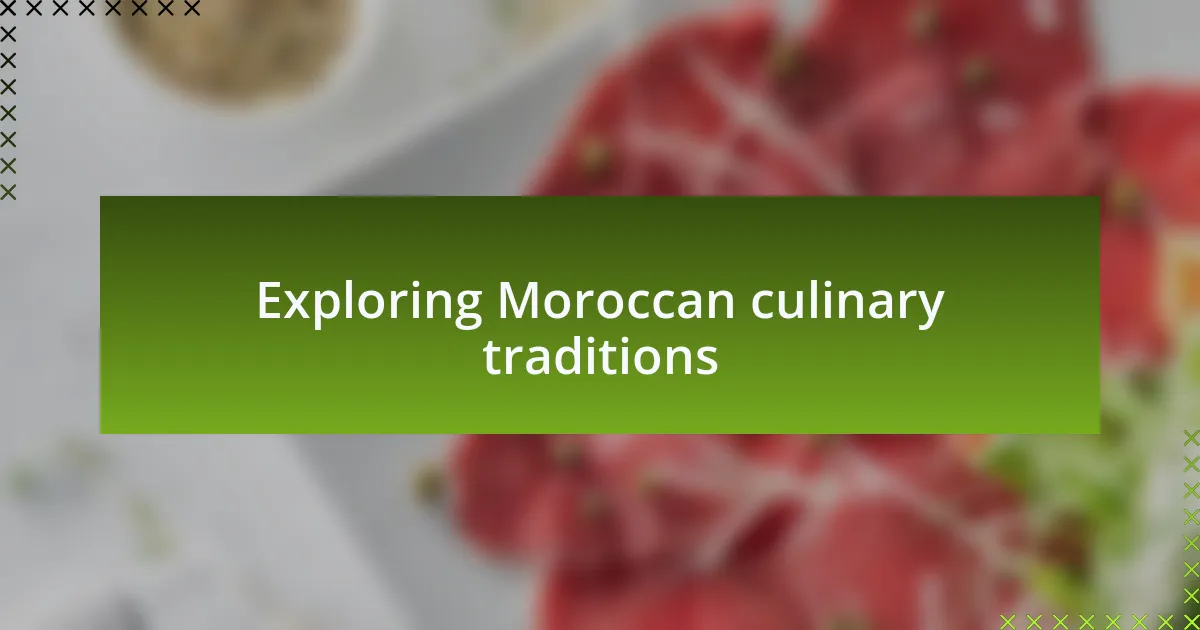
Exploring Moroccan culinary traditions
Moroccan culinary traditions are a vibrant tapestry woven from centuries of cultural exchange and local ingredients. When I first encountered the concept of Moroccan cuisine, the intricacy of spices like ras el hanout fascinated me—each blend tells a story that transports you to the bustling markets of Marrakech. Have you ever felt the enchanting pull of a spice that made you crave adventure in your cooking?
The art of preparing a traditional Moroccan meal often starts with a communal gathering. I vividly recall sharing a steaming bowl of harira during Ramadan, surrounded by friends, each spoonful brimming with warmth and connection. This experience illuminated how food in Morocco is not merely sustenance; it’s an invitation to engage, share, and celebrate togetherness.
One remarkable aspect of Moroccan cooking is the meticulous techniques passed down through generations, such as the slow-cooking method of a tagine. I still remember the first time I watched a chef skillfully arrange vegetables and spices in one of those iconic pots—each layer crafted with love to achieve perfect harmony. Isn’t it incredible how the cooking process itself becomes an expression of care and heritage?
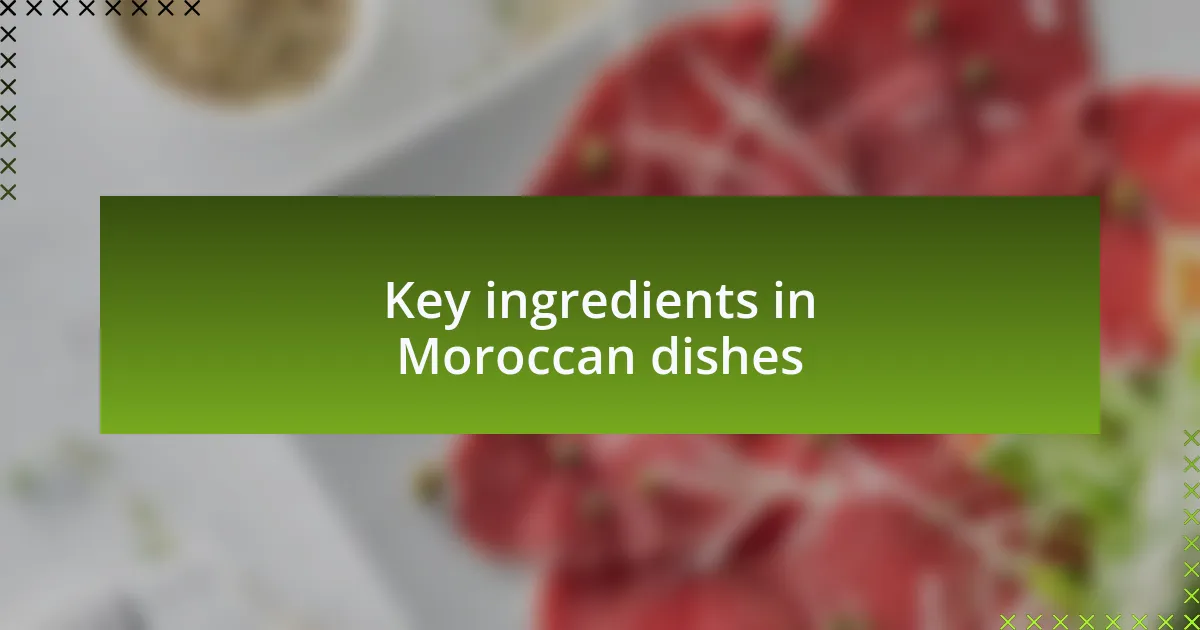
Key ingredients in Moroccan dishes
Moroccan cuisine thrives on its hallmark ingredients, and spices stand at the forefront. I still remember the heady aroma of cumin and coriander wafting through the air during one of my first cooking experiences with a local chef. Have you ever noticed how a simple spice can completely transform a dish? The depth of flavor that these spices add is nothing short of magical.
Another essential ingredient is preserved lemons, which add a unique tanginess and complexity. My first taste of a tagine bursting with their bright flavor was an eye-opener. It made me appreciate how a single ingredient can redefine the entire palate of a dish—reminding me that sometimes, it’s the unexpected components that create the most memorable experiences.
Don’t overlook the importance of fresh herbs, particularly cilantro and parsley, which are often used generously in Moroccan dishes. I fondly recall a vibrant salad at a family gathering, where the freshness of these herbs brought everything to life. How often do we underestimate the role of freshness in our meals? In Moroccan cuisine, it’s a key player, elevating every bite into a celebration.
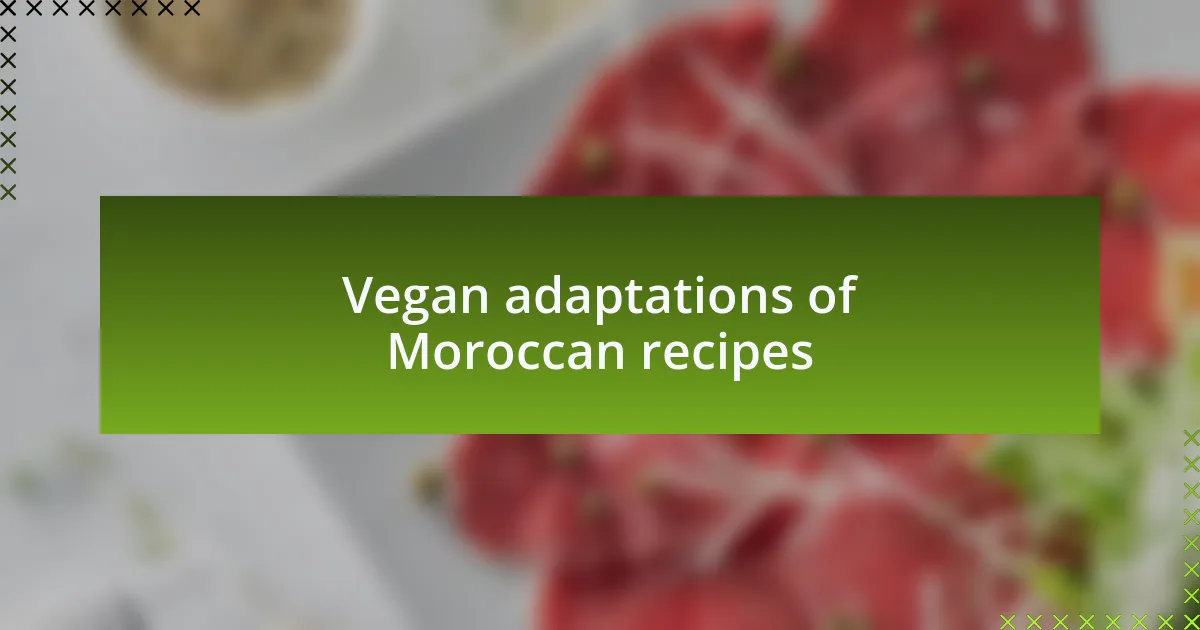
Vegan adaptations of Moroccan recipes
Adapting Moroccan recipes to vegan-friendly versions has opened up a delightful world of flavors. I recall experimenting with a classic vegetable tagine, swapping out the traditional proteins for a medley of seasonal veggies and hearty chickpeas. The vibrant colors of bell peppers and zucchini, simmered with a blend of spices, reminded me how plant-based meals could still be so rich and satisfying.
One of my fondest memories is the first time I made vegan pastilla. Traditionally, this dish features pigeon or chicken, but I turned to roasted almonds and layers of phyllo pastry, sweetened with cinnamon. It was an unexpected twist that packed an incredible crunch, and I couldn’t help but smile, thinking about how this dish could be both traditional and innovative at the same time. Have you ever tried a dish that challenged your expectations?
Experimenting with Moroccan harira soup was another highlight of my culinary journey. By replacing the meat with lentils and adding fresh herbs, I achieved a version that was just as hearty and flavorful. I vividly remember sharing it with friends during a chilly evening, where each spoonful felt unexpected yet comforting, showcasing that the essence of Moroccan cuisine transcends ingredients. How does food often bring us together and stir memories, even when we change things up?
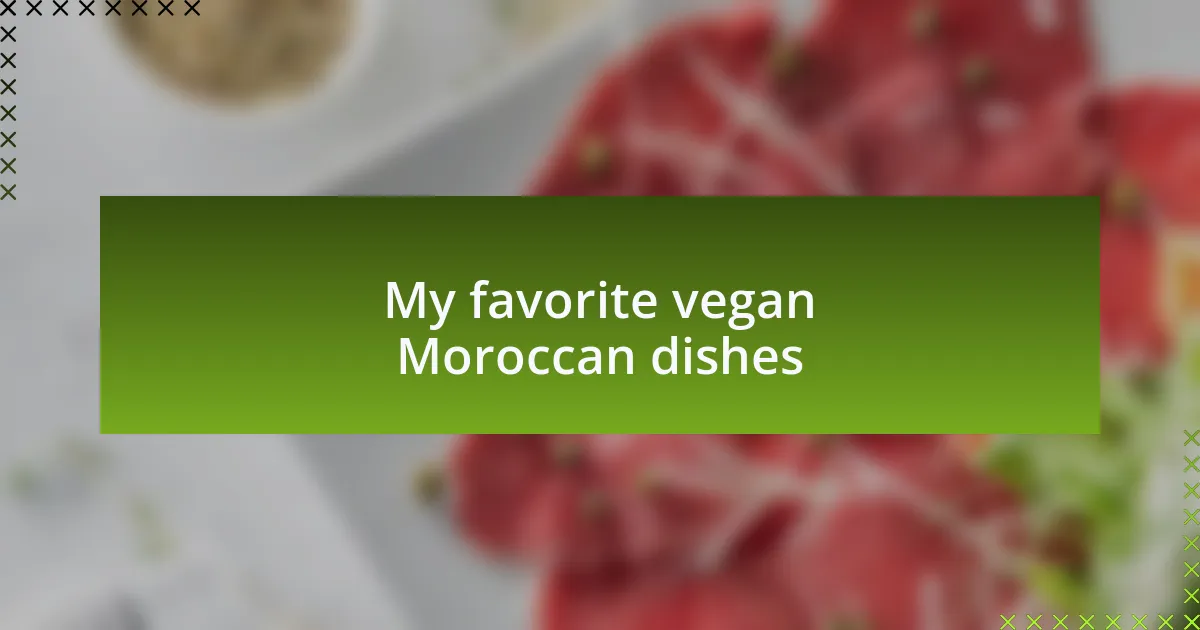
My favorite vegan Moroccan dishes
While exploring vegan Moroccan cuisine, I’ve developed a profound love for a dish called zaalouk. This smoky, roasted eggplant and tomato salad bursts with flavor thanks to cumin and paprika. I remember preparing it for a dinner party and being thrilled to watch my guests savor each bite. It’s funny how a simple dish can evoke such warmth, don’t you think?
Another favorite of mine is the chickpea and carrot tagine. The sweet and spicy combination of cinnamon and saffron with tender chickpeas and carrots transports me straight to the bustling souks of Marrakesh. I once prepared it for a close friend who had never tried Moroccan food before. Seeing her delight as she discovered new tastes made the cooking process just as rewarding as the meal itself.
And then there’s the mesmerizing Moroccan couscous. I love to make a vibrant version laden with seasonal vegetables and an aromatic broth. On one occasion, I invited my family over for a comforting Sunday lunch, and the couscous brought everyone together around the table. It’s remarkable how sharing food can weave together connections and create lasting memories—have you ever experienced that joy?
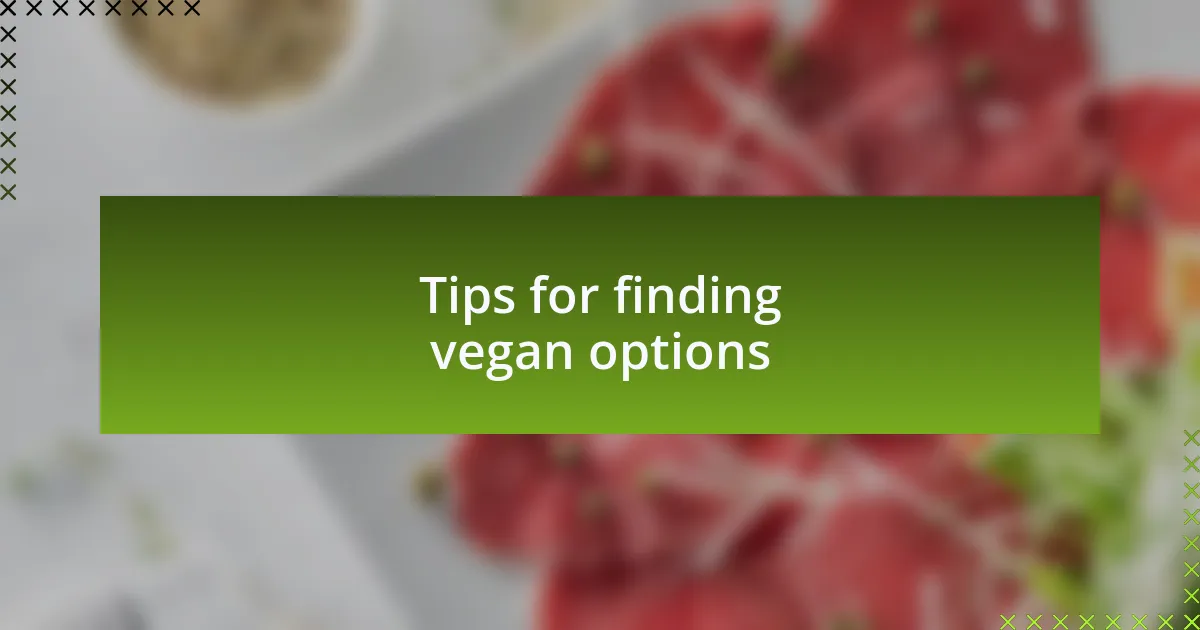
Tips for finding vegan options
Finding vegan options, especially in Moroccan cuisine, can sometimes feel like a treasure hunt. One thing I’ve learned is to look for restaurants that specialize in traditional dishes, as these places often have more flexibility to accommodate plant-based requests. I once asked a chef for a vegan version of a classic tagine, and to my delight, he enthusiastically shared his approach. It felt like a genuine connection was forged over my dietary preference.
When searching for vegan fare, consider browsing the menu for dishes that contain vegetables, legumes, or grains—Moroccan food features a rich tapestry of these ingredients. During one of my culinary adventures, I stumbled upon a small eatery that emphasized seasonal produce; I ended up trying a delightful orange and olive salad, and, to this day, I cherish that flavor experience. Isn’t it fascinating how a simple salad can surprise us and rewrite our narrative of what dining can be?
Don’t underestimate the power of asking questions. Engaging with waitstaff or chefs can lead to hidden gems on the menu or even custom meals. I remember a time when I explained my vegan preference to the owner of a quaint café, and he whipped up a stunning harira soup without meat that surpassed my expectations. Have you ever taken the plunge and asked for a special request that turned out to be a delightful surprise?